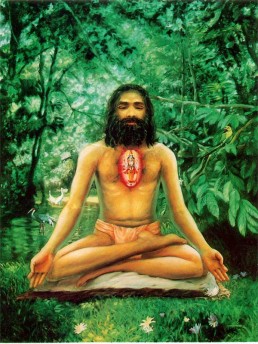At the very opening of this section, Krishna assures, with all emphasis at his command, that “NEITHER HERE NOR IN THE HEREAFTER, IS THERE ANY DESTRUCTION FOR HIM, WHO PERFORMS RIGHT ACTION.”
This statement is not a mere emotional assurance built upon some blind faith, or a Godly declaration that is to be swallowed down by the faithful, because of its being sacred words that have come out of the lips of a Prophet. The Hindus do not accept any divine prerogative, even for their gods, by which they can by-pass the individual intellect and the rules of logic. Religion is a “SCIENCE OF LIFE” and it must completely explain the WHY and the WHEREFORE of its practices.
Obedient to this incomparable trait in our culture, Krishna supports his statement with the philosophical truth: “NEVER FOR THE DOER OF GOOD, DEAR SON, A WOEFUL END.” One who acts rightly in the present, can come to no grief in the future, because the future is but a product of the past and the present.
The fear of Arjuna that the unsuccessful Yogin — a seeker obstructed and held up on the path — will get lost “AS A RENT CLOUD,” here and in the hereafter, has risen from his failure to appreciate the logical continuity and the perfect sequence that is ever found in life. To consider that death is the end of an existence which started with the accident of birth, is a philosophy too rudimentary to be considered complete and exhaustive. In fact, it is only with a stretch of imagination that we can consider such a theory as a philosophy.
Daring intellects, bravely pushing ahead in the quest to understand and comprehend the laws of life and the meaning and purpose of the Universe, cannot but accept that the existence of an individual in its present embodiment is but a single pearl in the necklace of Infinite Beauty adorning the bosom of Truth. The present is the product of the past, and thought by thought, action by action, knowledge by knowledge, we are creating for ourselves in the present the blue-print of our future. Therefore, the Hindus believe in previous lives as well as in future births for all embodied souls; this is otherwise called the theory of re-incarnation.
Based upon this principle, Krishna insists that no seeker is ever lost, although he may slip and fall, or even end his present manifestation; tomorrow is but today modified, but directly continued.
In addressing Arjuna as “O MY SON,” Krishna has here not only followed the traditional practice of the Upanishads, but there is also a deeper significance. However deceitful, cunning and cruel a brute one might be to everyone else in the world, one cannot ever come to advise a false philosophy to his own son. With fatherly love, the Man-of-Wisdom in Krishna is assuring Arjuna that one who is striving in the direction of evolution shall never come to suffer any REAL fall. On the ladder of cultural growth, each step that is placed forward is an ascent towards the Absolute Perfection.
WHAT EXACTLY WOULD BE THE DESTINY OF A MAN WHO COULD NOT COMPLETE HIS PILGRIMAGE IN YOGA? WHAT HAPPENS TO HIM THEN?

